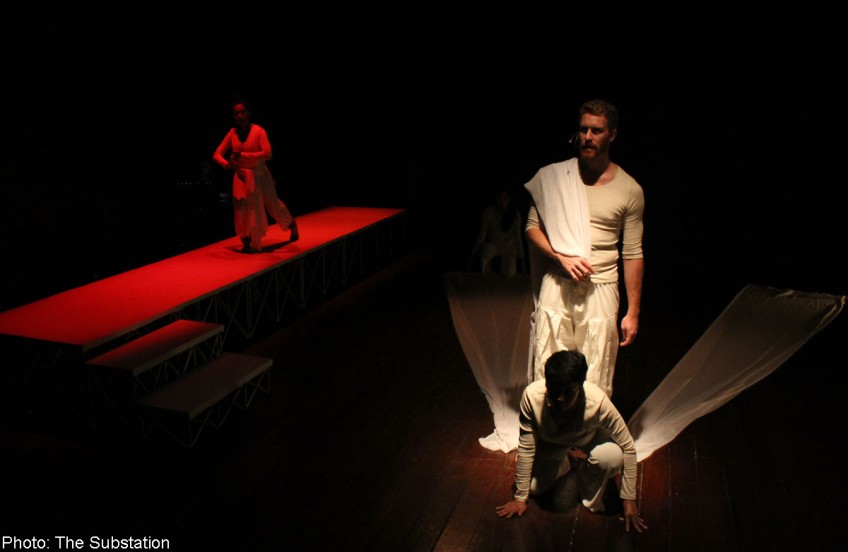Medea fires up with life stories

This is the second take on Medea to have barrelled through the Singapore stage this year and her fury has not dampened one bit.
She is a character who does not go quietly. There is something daringly subversive about her, a "barbarian" woman who went against her own family for love and is now trying to fit into the ranks of genteel royalty. In Euripides' 431 BC play, her husband, Jason (he of the Golden Fleece) abandons her for a new princess bride he finds more fitting of his status. Medea is devastated - and decides to seek revenge by killing off several people.
South Korean theatre group Seongbukdong Beedoolkee, which had staged Medea as part of the Singapore International Festival of Arts' pre-festival engagement programme, The O.P.E.N., had filtered Medea through modern media, including the reality TV show and the video game.
Actor Tan Shou Chen, who has put on his director's hat for this production, is keenly aware of the hysterical, bosom- thumping, clothes-rending stereotype that Greek tragedy can so easily topple into. This small but rich production, part of The Substation's Directors' Lab, manages to capture the emotions of loss and vengeance without succumbing to the extremes of chilly recitations or slovenly melodramas.
The emotions here are big and burly: rage, sorrow, fear, jealousy - and not always easy to keep under control.
But Tan turns this to his advantage: Control and the lack of it are recurring themes here. Medea's life is dictated by the men in power above and around her and she soon realises that death is the only way to shake off that stranglehold.
Elements of bharatanatyam, the sculpturesque and graceful Indian classical dance, surface repeatedly in this production. The dance is a demanding one, requiring a deep sense of physical control with every stamp of the foot or perfect flick of the wrist. It is a fire dance, the manifestation of the "fire" element (the others are earth, water, air and ether) and in this vein, Medea is ablaze with righteous fury.
Tan plays to this melodrama, allowing his performers room to emote but also reeling them in when the going gets too heavy. He uses their life stories as an intimate middle ground for the audience to experience Medea's kaleidoscope of emotions in a more personal way.
These are the best moments of the production, set up for the audience to contrast the otherworldliness of Medea's distress with grounded and instantly recognisable scenes from the actors' own lives.
Jo Tan snaps out of the Medea story to recall a severe scolding from her father when he caught her wearing a skimpy outfit and then returns into the narrative, only to tell Chad O'Brien's Jason: "I am that curse to your house, too."
The knife twists. Actors O'Brien, Farah Ong and dancer Ruby Jayaseelan also share short but heartwrenching memories, all revolving around family and mortality. The device becomes predictable after a while, since it is understood that each actor's turn will soon come, but it is still a clever gateway into Medea's world.
The production also pays its respects to the original Greek text with its long, twisty arguments between Jason and Medea, split three ways among Ong, Tan and Jayaseelan, each reacting to different trigger points. These expository scenes are sometimes difficult to wade through, weighed down by paragraphs and paragraphs of description and clunky philosophical debate, but they eventually get their points across. Distractions of props and set are kept to a minimum, with the white-clad performers relying mostly on fluid lengths of cloth that are converted from garments to swaddled infants to a billowing backdrop.
Here, the codified bharatanatyam fits snugly into the rituals of Greek drama, both with their stylised portrayals of character and storytelling. Tan nicely avoids the histrionics of (spoiler alert) princess Glauce's murder by having Jayaseelan perform the act through dance instead, her movements delicate but sharp, communicating the horror and sadness of the situation with symmetry and grace.
And it is in this mix of the ritual and the reinterpreted that Medea finds a sort of posthumous peace. This reinvention, which does not try to bite off more than it can chew, has allowed her room to breathe.

This article was first published on September 29, 2014.
Get a copy of The Straits Times or go to straitstimes.com for more stories.